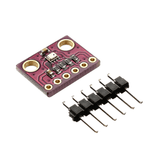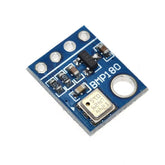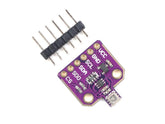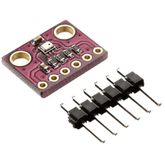What is BMP280: Pinout, Specifications & Working
Summary
Do you want to learn more about the BMP280 sensor? If the answer is Yes! then check this blog post that covers everything about how it works, pin configuration as well as how to work with the sensor. It also discusses the various applications of the BMP280, which include weather monitoring, altitude tracking, and indoor air quality measurement. If you're interested in learning more about this versatile sensor, keep reading!
Introduction
The BMP280 is one of the most advanced environmental sensors currently available on the market. It monitors temperature, pressure and relative humidity with great accuracy. With its tiny size, low power consumption and robust performance, this sensor makes a valuable tool for measuring atmospheric conditions in any environment.
This sensor is widely used to measure altitudes as well as monitor air pollution levels or weather patterns in remote locations where traditional utilities are lacking or unavailable.
Manufacturers can also use it to assess thermal comfort in buildings because they sense variations inside an enclosed space itself rather than outside measurements by conventional methods like thermometers that take external readings only.
The high-resolution I2C digital interface offers precision control over data transfer while ensuring reliable long-term operation due to superior signal integrity capabilities compared to other wireless communication protocols such as Bluetooth Low Energy (BLE).
Overall BMP280 provides tremendous value when looking for a cost-effective way of monitoring complex environments without sacrificing quality results!
What is a BMP280 Sensor?
The BMP280 sensor is a high-precision sensor module that detects atmospheric temperature, atmospheric pressure and air humidity.
The module supports both, the SPI interface as well as the I2C interface. Unlike other sensors, these sensors have already been calibrated.
They can start measuring temperature, pressure, and humidity as soon as they are turned on, and no further calibration is required.

As per the BMP280 datasheet, the sensor module requires a minimum voltage (VDD) of 1.71V, whereas sensor modules from earlier versions require 1.8V. (VDD).
Current usage for the BMP280 is 2.7uA, while that for the BMP180 is 12uA, and that for the BMP183 and BMP085 is 5uA respectively. New filter modes are also supported by the BMP280.
The remaining sensors only support either I2c or SPI, but the BMP280 sensor module supports both I2c and SPI protocols. The precision of this sensor module is 0.12 hPa or a change in height of 1 m.
It is frequently utilized in many applications because of these essential characteristics. Small signals are amplified using these front-end ICs, which are sensitive analogue amplifiers.
Then, this o/p of the signal is given to the Analog to Digital Converter, which converts the analog signal into a digital signal. The logic circuits use this voltage to interface with the rest of the device.
This is an inexpensive sensor that measures temperature and barometric pressure, but because pressure varies with altitude, we can also use it as an altimeter with an accuracy of about one meter.
However, there is another sensor called BME280 that offers Temperature, Humidity, Barometric Pressure, and Altitude, but as you can surely assume, it is rather expensive if you want to get all the weather information in one package.
What is BMP280 used for?
The BMP280 is a barometric pressure sensor with built-in temperature compensation. Due to the very small footprint of SMD devices (2.0mm x 2.5mm), a breakout board is required for bench use.
It's so tiny that you can use it on your mobile phone. Until you realize that pressure can also be used to measure altitude, you might think that this device would only be used in a weather station environment.
This barometric Pressure sensor is used for two purposes one is to measure the Barometric pressure and the second thing to measure temperature. This sensor is used for smart cities, smart homes and other IoT applications.
BMP280 Pin Configuration

|
VCC |
Sensor Power Supply 3.3V |
|
GND |
Common ground |
|
SCL |
Serial Clock Pin |
|
SDA |
Serial Data Pin |
|
CSB |
This is a chip select pin for SPI communication. |
|
SDO |
Serial Data Out for SPI communication. |
Features:
- For detecting temperature with a 1.0°C accuracy and barometric pressure with an absolute accuracy of 1 hPa, this precision sensor is the best low-cost option.
- It may also be used as an altimeter with an accuracy of 1 meter because pressure fluctuates with altitude and pressure measurements are so accurate.
- Pitch of a pin: 2.54mm
- Module Dimensions: 11.5mm x 15mm
Specifications:
|
Chip name |
BMP280 |
|
Power Supply |
3V or .3.3 V DC |
|
Max Current |
1.12mA |
|
Air pressure |
300 - 1100hPa |
|
Temperature range |
-40 to +85 degrees Celsius |
|
Interfaces |
I2C and SPI |
|
Current consumption by sensor |
2.7 mA |
|
Sampling rate |
1 Hz |
How Does bmp280 Sensor Works?
The barometric Pressure sensor module BMP280 operates at a minimum voltage (VDD) of 1.71 V, whereas previous versions of the sensor module operate at 1.8 V (VDD).
In terms of power consumption, the BMP280 consumes 2.7uA, the BMP180 consumes 12uA, and the BMP183 and BMP085 consume 5uA each. BMP280 also supports a new filter mode.
The BMP280 sensor module supports I2c and SPI protocols, the rest of the sensors support either I2c or SPI.
The BMP280 sensor module has an accuracy of ±0.12 hPa, which corresponds to a height difference of ±1 m. These important features make it mainly used in various applications.
A BMP sensor consists of a pressure sensing element, a humidity sensing element, and a temperature sensing element, which are further connected to a pressure front end, a humidity front end, and a temperature front end.
These front-end ICs are delicate analog amplifiers used to amplify small signals. The output of this analog front-end IC is fed to the ADC as an input signal.
In it, analog values are converted into digital voltages, and this voltage is fed to logic circuits and further interfaces with the outside world.
The BMP280 sensor module is configured with three power modes: sleep mode, force mode, and normal mode. In sleep mode, no measurements are taken and power consumption is minimized.
In forced mode, a single measurement is taken according to the selected measurement and filter options. In normal mode, measurement and standby periods alternate continuously, the cycle time of which is defined by Tstandby. The current in standby mode is slightly higher than in sleep mode.
How to work with the BMP280 Sensor?
To work with the barometric pressure sensor, you need to connect a microcontroller, As shown below, we just connect the BMP280 sensor to the ESP32's I2C pin.

Connections as per above depicted Diagram
|
ESP32 |
BMP280 |
|
3.3V |
VCC |
|
GND |
GND |
|
SCL |
22 |
|
SDA |
21 |
Code:
#include <BMP280_DEV.h>
float temperature, pressure, altitude;
BMP280_DEV bmp280(21, 22); //(SDA and SCL pins)
void setup()
{
Serial.begin(115200);
bmp280.begin();
bmp280.setTimeStandby(TIME_STANDBY_2000MS);
bmp280.startNormalConversion();
}
void loop()
{
if (bmp280.getMeasurements(temperature, pressure, altitude))
{
Serial.print(temperature);
Serial.print(F("*C "));
Serial.print(pressure);
Serial.print(F("hPa "));
Serial.print(altitude);
Serial.println(F("m"));
}
}
Applications:
- Smart Agricultural Systems: The BMP 280 measures atmospheric pressure. These sensors are connected to a Wi-Fi module (node MCU) and depend on each other to increase the sensitivity of the irrigation system. Collected data is uploaded to the cloud.
- Home weather stations and weather forecasts
- Mobile Phones: This module is small and lightweight making it easy to implement in mobile phones.
Conclusion
In this blog post, we have learned that The BMP280 barometric pressure sensor is an absolute powerhouse that can be utilized for a multitude of purposes, from keeping tabs on the weather to regulating the air quality in your humble abode. With its remarkably accurate readings and convenient pin layout, the BMP280 is an undeniably popular pick amongst hobbyists and professionals alike. So, whether you're a do-it-yourself enthusiast or just someone who's insatiably curious about the world we inhabit, the BMP280 sensor is a must-have addition to your repertoire. Don't let this opportunity slip through your fingers! Get your hands on the BMP280 and unlock the countless prospects it holds to elevate your projects to unparalleled heights!
If you appreciate our work don't forget to share this post and leave your opinion in the comment box.
Please check out other blog posts about Popular electronics
Make sure you check out our wide range of products and collections (we offer some exciting deals!)
Excerpt
Frequently Asked Questions
1. What is BMP280 used for?
The BMP280 - is a digital pressure sensor that reigns supreme in the realm of barometric pressure and temperature measurement. It is used in applications such as weather monitoring, altitude measurement, and indoor navigation systems. The sensor's peerless precision, low power consumption, and diminutive size make it an embodiment of suitability for a copious amount of use cases.
2. What can BMP280 measure?
The BMP280 sensor is an advanced digital gadget that boasts a remarkable ability to gauge atmospheric pressure and temperature with precision. It's commonly leveraged in cutting-edge weather stations, altimeters, and GPS modules to furnish comprehensive weather data and altitude measurement.
3. Can BMP280 measure temperature?
Yes, BMP280 can measure temperature. It is a digital barometric pressure and temperature sensor that provides accurate temperature readings.
4. What is the BMP280 sensor used for?
The BMP280 sensor is used for measuring barometric pressure and temperature. It’s commonly applied in weather stations, altitude tracking, and various IoT devices. Its compact design and high precision make it ideal for both DIY projects and professional applications in electronics and robotics.
5. How does the BMP280 measure pressure and temperature?
The BMP280 uses a piezoresistive pressure sensor and a thermistor to measure pressure and temperature. It converts the physical changes in pressure and temperature into electrical signals, which are then processed to provide accurate readings. This dual functionality allows for precise environmental monitoring.
6. What is the difference between BMP180 and BMP280?
The BMP180 and BMP280 sensors differ mainly in performance and power consumption. The BMP280 offers better accuracy and faster response times while consuming less power. Additionally, the BMP280 includes advanced filtering features, making it more suitable for modern IoT applications compared to its predecessor.
7. How to interface BMP280 with Arduino?
To interface the BMP280 with Arduino, connect the sensor's SDA and SCL pins to the Arduino's I2C pins (A4 and A5). Then, use a library such as Adafruit's BMP280 library to read data. Upload the sample code, and you'll be able to access accurate temperature and pressure readings easily.
8. Does BMP280 measure humidity?
No, the BMP280 does not measure humidity. It is solely designed for measuring barometric pressure and temperature. If you need humidity readings, consider using a dedicated sensor like the DHT22 alongside the BMP280 for comprehensive environmental monitoring.
9. What is the accuracy of the BMP280 sensor?
The BMP280 sensor boasts an impressive accuracy of ±1 hPa for pressure measurements and ±1°C for temperature. This high level of precision makes it suitable for various applications, including weather forecasting and altitude measurement in robotics and electronics projects.
10. Which communication protocol does BMP280 use?
The BMP280 utilizes both I2C and SPI communication protocols. This flexibility allows you to choose the best connection method for your project, whether you're working with Arduino, Raspberry Pi, or other microcontrollers in various electronic applications.
11. What are the applications of BMP280 in IoT?
The BMP280 sensor is widely used in IoT applications like weather stations, smart homes, and drones. It helps monitor environmental conditions, track altitude changes, and enhance other sensors' data for better decision-making in connected devices. Its compact size makes it ideal for various IoT projects.
1. What is BMP280 used for?
The BMP280 - is a digital pressure sensor that reigns supreme in the realm of barometric pressure and temperature measurement. It is used in applications such as weather monitoring, altitude measurement, and indoor navigation systems. The sensor's peerless precision, low power consumption, and diminutive size make it an embodiment of suitability for a copious amount of use cases.
2. What can BMP280 measure?
The BMP280 sensor is an advanced digital gadget that boasts a remarkable ability to gauge atmospheric pressure and temperature with precision. It's commonly leveraged in cutting-edge weather stations, altimeters, and GPS modules to furnish comprehensive weather data and altitude measurement.
3. Can BMP280 measure temperature?
Yes, BMP280 can measure temperature. It is a digital barometric pressure and temperature sensor that provides accurate temperature readings.
4. What is the BMP280 sensor used for?
The BMP280 sensor is used for measuring barometric pressure and temperature. It’s commonly applied in weather stations, altitude tracking, and various IoT devices. Its compact design and high precision make it ideal for both DIY projects and professional applications in electronics and robotics.
5. How does the BMP280 measure pressure and temperature?
The BMP280 uses a piezoresistive pressure sensor and a thermistor to measure pressure and temperature. It converts the physical changes in pressure and temperature into electrical signals, which are then processed to provide accurate readings. This dual functionality allows for precise environmental monitoring.
6. What is the difference between BMP180 and BMP280?
The BMP180 and BMP280 sensors differ mainly in performance and power consumption. The BMP280 offers better accuracy and faster response times while consuming less power. Additionally, the BMP280 includes advanced filtering features, making it more suitable for modern IoT applications compared to its predecessor.
7. How to interface BMP280 with Arduino?
To interface the BMP280 with Arduino, connect the sensor's SDA and SCL pins to the Arduino's I2C pins (A4 and A5). Then, use a library such as Adafruit's BMP280 library to read data. Upload the sample code, and you'll be able to access accurate temperature and pressure readings easily.
8. Does BMP280 measure humidity?
No, the BMP280 does not measure humidity. It is solely designed for measuring barometric pressure and temperature. If you need humidity readings, consider using a dedicated sensor like the DHT22 alongside the BMP280 for comprehensive environmental monitoring.
9. What is the accuracy of the BMP280 sensor?
The BMP280 sensor boasts an impressive accuracy of ±1 hPa for pressure measurements and ±1°C for temperature. This high level of precision makes it suitable for various applications, including weather forecasting and altitude measurement in robotics and electronics projects.
10. Which communication protocol does BMP280 use?
The BMP280 utilizes both I2C and SPI communication protocols. This flexibility allows you to choose the best connection method for your project, whether you're working with Arduino, Raspberry Pi, or other microcontrollers in various electronic applications.
11. What are the applications of BMP280 in IoT?
The BMP280 sensor is widely used in IoT applications like weather stations, smart homes, and drones. It helps monitor environmental conditions, track altitude changes, and enhance other sensors' data for better decision-making in connected devices. Its compact size makes it ideal for various IoT projects.










